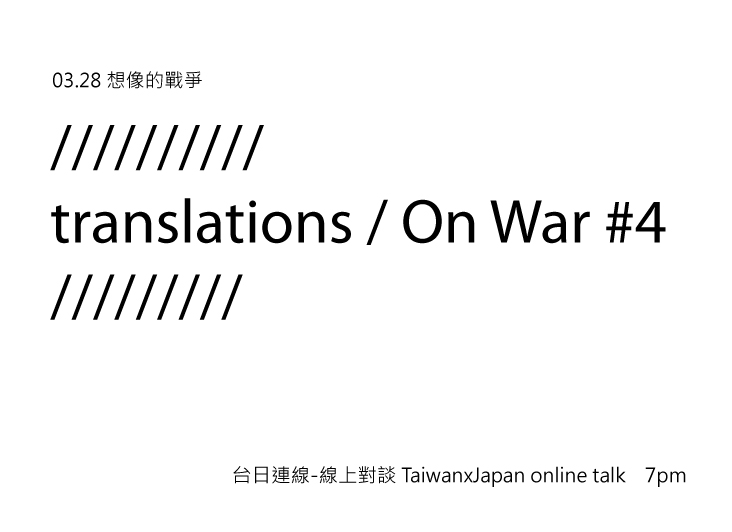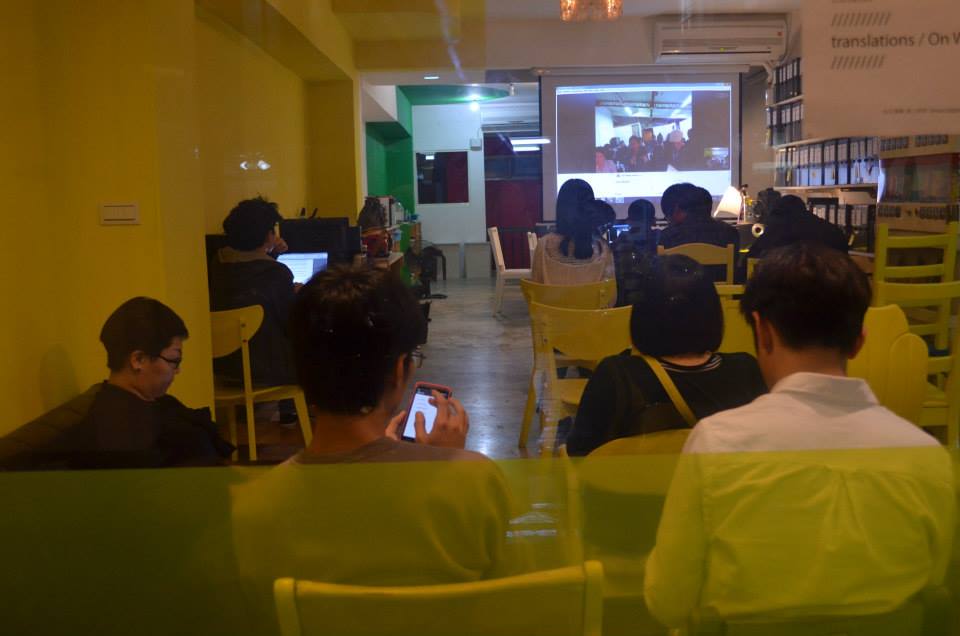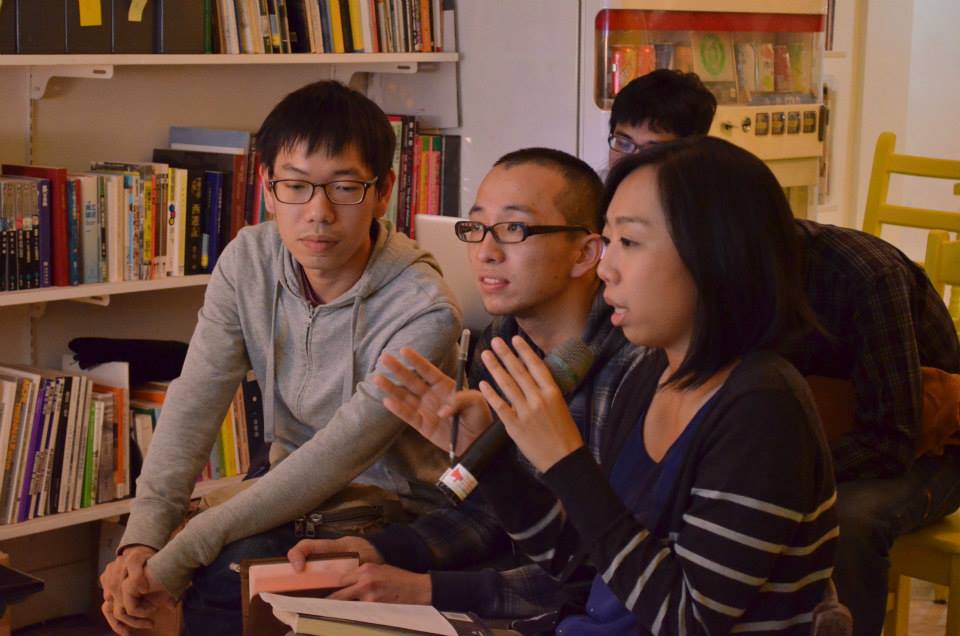03.28 想像的戰爭 translations/ On War #4 | 台日連線-線上對談 TaiwanxJapan online talk 7pm
(For English please scroll down)
關於兵役:
與會人員:張立人(藝術家)、吳其育(藝術家)、葉佳蓉(策展人)、佐佐瞬(藝術家)、藤井光(藝術家/導演)、後藤櫻子(藝術家)
對談項目:
1. 對你來說,何謂想像的戰爭?
2. 對於戰爭思考的經驗
3. 戰爭對於藝術的有甚麼衝擊?
4. 如果要用不同的方式改寫戰爭,你會如何詮釋?
5. 對你而言,戰爭如何發生?為何發生?
6. 戰爭何時結束?
7. 如果世界沒有戰爭,你覺得世界會變怎樣?
8. 甚麼是討論戰爭?
[台北]
時間: 2013年3月28日(四),19:00~21:00
地點: TCAC (台北市大安區安東街19-1號)
語言: 英文、中文、日文
[橫濱]
時間: 2013年3月28日(四),20:00~22:00 (19:30開放入場)
地點: blanClass (神奈川縣橫濱市南區南太田4-12-16
入場費: 1200日元/1000日元學生票
語言: 英文、中文、日文
translations系列討論由日本藝術團體camp發起,邀請來自不同國家的策展人/藝術家針對某個議題進行對談,本次在台北TCAC舉行的活動主題為”War戰爭”系列的第四彈,台日藝術家將透過網路連線,透過言語翻譯開展討論,並且和兩地的觀眾交流。台北場免費入場,歡迎有興趣的朋友隨時加入。
主辦單位介紹:
Camp
Camp是由藝術家、評論者、策展人、研究者、學生所組成,固定性進行藝術討論的團體,也因為每個人關注和研究的方向不同,每次談話都會有不同主題。
TCAC
台北當代藝術中心是由一群在地與國際的藝術專業人士與知識份子所組成的。TCAC相信藝術是民主社會蓬勃發展的主要動力之一,藝術必須擁有自由,才能反映並回應它所處的年代
與談人簡介:
張立人 Li-Ren Chang
1983年生,2006年畢業於國立台灣藝術大學,2008年進入台南藝術大學造型研究所。近期主要參展紀錄包含「真真-當代超常經驗展(TRUE ILLUSION, ILLUSORY TRUTH)」(台北市立美術館、台北、2013)、「安全區」(鳳甲美術館、台北、2012)、「Parts and Whole – Today’s Perspectives in Art from East Asia」(Hiromiyoshii、東京、2011)、「渾變-台日交流展」(關渡美術館、台北、2011)等。
吳其育 Chi-Yu Wu
1986年生。2011年畢業於台北藝術大學新媒體研究所。主要個展「蒼蠅疤:一萬個存在」(2011、非常廟藝文空間(VT Art Salon)、台北)。近期重要展覽包含「綠盒子:重繪形貌-媒體現實的空間(GREENBOX: REMAPPING – THE SPACE OF MEDIA REALITY)」(天鴻美和院文化藝術發展中心、杭州、2013)、「第九屆釜山國際錄像藝術節(9th Busan International video festival)」(Openspace Bae、釜山、2012)、「心動EMU(Crush on EMU)」(台北當代藝術館、台北、2012)、「渾變-台日交流展」(關渡美術館、台北、2011)等。
葉佳蓉 Zoe Yeh
1985年生,2012年畢業於台北藝術大學藝術跨領域研究所。主要策展「無色的折射Transparent Refraction」(tamtamArt、柏林、2011)、「非處之棲Living in an Out-Of-Place」(鳳甲美術館、台北、2011)、「不適的召喚Discomfort’s Calling」(House of Arts、柏諾/捷克、2011)、「那些因為你聲音太大而我沒聽清楚的事Little Voices」(台北、2010)。研究出版包含『田, Field, Policko』(共著)、網路線上雜誌「GAZE」(http://www.gaze-upon.com/)等。
佐佐瞬 Sasa Shun
1986年出生於日本宮城縣,目前居住於東京。透過聲音、構造物、文本等多層次的表現,將虛構與現實、不同的時空交叉,將「現在」從複數、豐富的可能性當中展開,近年多以展示和行為相互搭配的方式進行創作。主要展覽包含「No Man’s Land」(法國駐日大使館、東京、2009年)、「大邱攝影雙年展2012 Dance on a Thin Line」(大邱藝術發展研究所、韓國、2012年)、「MOT Annual 2012」(東京都現代美術館、2012年)等。
http://www.sasashun.com/
藤井光 Hikaru Fujii
1976年東京都出生,目前居住於東京。巴黎第八大學美學、藝術第三博士課程DEA畢業。從1995年赴法到2005年返日,透過現代日本社會、政治情況作為創作素材。
後藤櫻子 Oko Goto
1986年出生。英國金匠學院美術科(Studio Practice and Contemporary Critical Studies)畢業。2009年開始任職於東京G/P+g3/ gallery、art beat publishers。主要展出包含「Otto Ou solo exhibition」(jubilee Gallery、名古屋、2011)、「Urbania Collective: GSK Contemporary」(The Royal Academy of Arts、倫敦、2008)、並發行『Invisible Man / Paper』(Vol.1 – 3)等。
event page:
http://www.facebook.com/events/540188112679909/
camp FB:
http://www.facebook.com/on.camp?ref=ts&fref=ts
//////////
translations / On War #4
//////////
On National Service : Chang Li-ren (Artist), Wu Chi-Yu (Artist), Zoe Yeh (curator), Shun Sasa (Artist), Hikaru Fujii (Artist / Film director), Oko Goto (Artist)
1: As for you, what is image of war?
2: What is the experience of thinking war for you?
3: What kind of impact does war have on art?
4: If you reword war in a different way, what do you translate?
5: Where does war happen, and what is the cause of “war”?
6: When does war finish?
7: If there were no war in the world, what do you think how world there are?
8: What is talking about war?
[ Taipei ]
Date and Time: Tuesday, 28 March, 2013, 19:00~21:00 (doors open at 18:30)
Venue : TCAC (No.19-1, Andong St., Da’an Dist., 10666 Taipei) [Map]
Language: English, Chinese, Japanese
[ Yokohama ]
Date and Time: Tuesday, 28 March, 2013, 20:00~22:00 (doors open at 19:30)
Venue : blanClass (4-12-16 Minamiota, Minami-ku, Yokohama City, Kanagawa) [Map]
Admission: JPY1200 / JPY1000 for Students (Booking required)
Language: English, Chinese, Japanese
Camp, a Japanese art group, launched the translations talk series and invites curators and artists from different countries to talk about certain issues. The event held this time at TCAC is the fourth talk of the “On War” series. Taiwanese and Japanese Artists will take part in the talk online with translation and exchange views with audiences in both countries.
Camp
Camp, a group which holds discussions on art regularly, is formed by artists, critics, curators, researchers, and students. Due to the members’ different concerns and fields of research, each discussion involves different topics.
TCAC
Taipei Contemporary Art Center is formed by local and international art professionals and intellectuals. TCAC believes that art is one of the major boosts to the thriving development of a democratic society and that art should be free to reflect and respond to the time when it exists.
Participants
Chang Li-Ren
Born in 1983. Graduated from National Taiwan University of Arts and research student at National Tainan University of the Arts since 2008. He has participated in exhibitions such as ‘TRUE ILLUSION, ILLUSORY TRUTH’ (2013, Taipei MOCA, Taipei), ‘Safe Zone for Artists chang’ (2012, Hong-gah Museum, Taipei), ‘Parts and Whole – Today’s Perspectives in Art from East Asia’ (Hiromiyoshii, Tokyo, 2011), ‘Trans-plex Weaving Platform'(2011, Kuandu Museum of Fine Arts, Taiwan) among others.
Wu Chi-Yu
Born in 1986. Graduated from National Taipei University of Arts in 2011. He had his solo exhibition ‘Flies 8 : The Ten Thousand Beings’ (2011, VT Art salon, Taipei). His work was also included in many group exhibition include ‘GREENBOX: REMAPPING – THE SPACE OF MEDIA REALITY’ (2013, Tianhong Mei Heyuan Arts Center, Hangzhou), ‘9th Busan International video festival’ (2012, Busan), ‘Crush on EMU’ (2012, MOCA Taipei, Taipei), ‘Trans-plex Weaving Platform'(2011, Kuandu Museum of Fine Arts, Taiwan) among others.
Zoe Yeh
Born in 1985. Graduated from National Taipei University of Arts in 2012. Independent curator. Hear major curatorial work includes ‘Transparent Refraction’ (2011, tamtamArt, Berlin), ‘Living in an Out-Of-Place’ (2011, Hong-gah Museum, Taipei), ‘Discomfort’s Calling’ (2011, House of Arts, Brno), ‘Little Voices’ (2010, Taipei). She has co-authored a book ‘田, Field, Policko’ and works as a co-editor and writer for on-line magazine’GAZE’.
http://zoecjyeh.wordpress.com/
Shun Sasa
Born in 1986 in Miyagi, Japan. Based in Tokyo. Graduated with BA in Fine Art from Tokyo Zokei University. Sasa utilizes complex layers of sound, structure, and text in his installation work to create a site where audience can feel and be a part of a world of overlapping fiction, reality, and distinct space-time, creating fictitious moments that may come true in the future. One of his recent works, The Desk and The Monitor, looks at the possibilities of the wood from the desk being made into other objects, such as a violin, a baseball bat, or a spectacle frame. His major exhibitions include: MOT Annual 2012, Museum of Contemporary Art Tokyo, 2012; Daegu Photo Biennale 2012: Dance on a Thin Line, Daegu Art Factory, 2012; No Man’s Land, Ambassade de France au Japon, Tokyo, 2009.
http://www.sasashun.com/
Hikaru Fujii
Artist / Film director. Born in Tokyo, Japan in 1976. He studied at ENSAD and obtained DEA (Athletic, Sciences and Technology of the Arts) from Universite de Paris 8. From 2005, he works with the visual media to intuitively deal with the social and political situation in Japan. And also he holds the image making workshop on the concept of “the media as stationary”, and tries to democratize a visual media. His recent main activities are “Artists and the Disaster / Documentation in progress” at Art Tower Mito in 2012; “Create my own media” at YCAM (Yamaguchi Center for Arts and Media) in 2010-2011; “Now, what is the barrier?” at Sendai Mediatheque in 2010, and “Reflection/ ‘another world’ in the image” at Art Tower Mito in 2010. Since the disaster of 3.11, he starts shooting at the stricken area on the theme of the relationship between 3.11 and the art, and making a work as “3.11 Art Documentation”, “PROJECT FUKUSHIMA!” and “Record of Coastal Landscape”.
http://hikarufujii.com/
Record of the talk
The talk, the fourth one on the topic “On War”, is included in the Translations talk series launched by Japanese Art group Camp. The group invites curators and artists form different countries to talk about certain issues. The discussion today centered on the relation between military service and Taiwanese artists and modern art. In the beginning, curator Zoe Yeh briefly introduced the system of Taiwanese military service to the Japanese participants, and then artists Li-Ren Chang and Wu Chi-Yu shared the experiences and changes they had during military service.
Artist Li-Ren Chang graduated from National Taiwan University of Arts in 2006 and entered the Graduate Institute of Plastic Arts at Tainan National University of the Arts in 2008. He recently took part in exhibitions TRUE ILLUSION, ILLUSORY TRUTH (Taipei Fine Arts Museum, Taipei, 2013) and Safe Zone for Artists (Hong-Gah Museum, Taipei, 2012). Artist Chi-Yu Wu graduated from the School of Film and New Media at Taipei National University of the Arts in 2011. His major solo show was Flies 8: The ten thousand beings, and his recent exhibitions include GREENBOX: REMAPPING – THE SPACE OF MEDIA REALITY (ARTLINKART, Hangzhou, 2013) and the 9th Busan International Video Festival (Openspace Bae, Busan, 2012).
At the beginning of the talk, Japanese artist Hikaru Fujii said that with only a short distance between the two countries, Taiwan requires military service, but Japan does not. He is very interested in the difference. Also, he explained that because of its defeat in the Second World War, Japan holds a negative attitude towards war, and the government discourages the existence of military service and forces. But he emphasized that the two sides of the talk are not taking opposing angles to view the issue; rather, they hope to understand Taiwan’s military service more through the talk and to discuss whether it influences Taiwanese artists.
When first asked about Taiwanese artists’ opinions on military service, Chang replied that doing the service was a very unique experience. “It involved a lot of complicated emotions so we cannot tell whether it is good or bad.” He said that serving in the military is like being drawn out from normal conditions and placed in a system that one has never experienced and where everything is very simple and referred to by numbers rather than names. Then, the talk proceeded to whether serving in the military feels like being in isolated conditions and whether it can be taken as a topic of creation. Wu said the service was interesting at first, but later he felt that it’s merely his duty and “the creative life before seemed to have nothing to do with me.” Clear-cut ranks and the regular life seem to be everyone’s most commonly-shared impression on military service.
Then, Li-Ren Chang shared one of his interesting experiences in the military. For most people, art history simply consists of words and picture, and they would not purposely flip through books on this topic. Chang said that during one surprise check in his service, everyone’s pornography was seized, but his books of art history was left untouched. Therefore, he shared some of the artistic pictures of nude figures to others, which thoroughly reflected the Chinese proverb “Share and share alike.”
At the end of the talk, the Japanese artists wondered if the military service increases national identity and explained that they question so because some Japanese political parties hope to reinstate military service to help retrieve the patriotism of Japanese people. Chi-Yu Wu emphasized that serving in the military actually increases not only national identity but the understanding of the nation. Also, responding to whether the military service influences artists on their creation, Chang and Wu both considered that there is no direct or negative impacts. The service changes one’s thoughts but does not significantly affect their creation.
Through the talk, we could see that military service brings more changes to Taiwanese artists’ personalities and thoughts than to their creation. Also, the Japanese artists discovered in the conversation that military service is not as serious as how it is usually perceived; rather, a variety of emotions and attitudes are concerned. As for the men who are going to do the service, they would find with the talk that it is essential to bring along with them books on art history.
活動記錄:
文字 text:陳嘉臨
攝影 photo:TCAC
本次討論主題為“War戰爭”系列第四彈,Translations 系列討論由日本藝術團體Camp發起,邀請來自不同國家的策展人與藝術家針對某個議題進行對談。
今天的討論則圍繞在兵役對台灣的藝術家與現代藝術間的關係,首先由策展人葉佳蓉向日本方面簡單介紹台灣兵役制度,接著由藝術家張立人與吳其育分享各自實際的兵役生活,以及兵役帶給他們的變化。
與會藝術家張立人,2006年畢業於國立台灣藝術大學,2008年進入台南藝術大學造型研究所,近期主要參展紀錄包含「真真-當代超常經驗展(TRUE ILLUSION, ILLUSORY TRUTH)」(台北市立美術館、台北、2013)、「安全區」(鳳甲美術館、台北、2012);藝術家吳其育於2011年畢業於台北藝術大學新媒體研究所,主要個展「蒼蠅疤:一萬個存在」,近期重要展覽包含「綠盒子:重繪形貌-媒體現實的空間(GREENBOX: REMAPPING – THE SPACE OF MEDIA REALITY)」(天鴻美和院文化藝術發展中心、杭州、2013)、「第九屆釜山國際錄像藝術節(9th Busan International video festival)」(Openspace Bae、釜山、2012)。
討論一開始,日本藝術家藤井光表示,日本與台灣只有一線之隔,台灣有兵役,在日本則沒有,這樣的差異讓他覺得很有趣,也解釋日本之所以沒有兵役的原因在於二次大戰日本戰敗,導致對戰爭採否定態度,政府也不鼓勵兵役及軍隊的存在,但藤井光也強調,此次會談雙方不是站在「對等」的角度看這件事,而是希望藉由這次的討論更了解台灣的兵役制度,以及兵役是否會對台灣的藝術家造成影響。
首先問到台灣的藝術家對兵役的看法,張立人表示,兵役是一個很特別的人生經驗,「很多複雜的情緒參雜在裡面,所以不能說它好或不好」,當兵就像把你從平常的狀態抽離,放到一個你從沒看過沒見過的機制,一切都變得很簡單,彼此間只有「編號」,沒有名字。接著討論到會不會覺得當兵時是一個疏離的狀態,會不會想讓當兵成為創造的一個題材?吳其育則表示,一開始覺得很有趣,但之後就會覺得自己活在裡面,我的工作就是這些,「以前創作的生活好像跟自己沒有什麼關係了」;階級分明、規律的生活,好像是大家對當兵再認同不過的感受了。
而後,張立人分享了自己在軍隊裡有趣的經驗,對一般人來說藝術史可能就是文字與圖片,在生活中不會刻意翻閱這種類型的書籍,張立人表示在一次的突襲臨檢,其他人的色情書刊都被沒收,只有他的藝術史沒有被拿走,所以他分享了一些比較裸露的「藝術照片」給其他人,完完全全體現了"有福同享有難同當"的精神。
最後,日本藝術家想知道兵役是否會增加對國家的認同感,也解釋到會這麼問是因為在日本有些黨派希望藉由恢復兵役制,把日本人民的愛國情懷找回來。吳其育強調,事實上他覺得當兵是增加更多對「國家的認識」而不是單單對國家的認同感,同時也回應了兵役是否對台灣藝術家在創作上的影響,張立人與吳其育一致認同影響並不直接,事實上可以說沒有負面的影響,經歷兵役後會有想法上的轉變,但在作品方面不會有明顯的影響。
從這次的討論可以發現,兵役對台灣的藝術家可能沒有造成太多創作上的改變與影響,卻是個性以及個人想法上的轉變,在一來一往的問與答中,也讓日本藝術家發現,兵役或許不是一直以來想像的嚴肅,而是有許多不同的情緒與態度,對即將踏入兵役旅程的男生們,經過這次的討論與分享,他們會發現,多帶幾本藝術史是必要的。
更多照片:https://www.facebook.com/media/set/?set=a.10152101070929878.1073741869.361110184877&type=3



